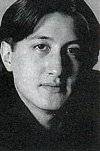It is always fascinating to compare pianists in standard fare, but when the pianists are Kissin and Kempf the task is immeasurably more interesting. Evgeny Kissin, now 30, has already established a reputation as one of the most brilliant pianists of our time, and Freddy Kempf, 22, is well on his way to becoming one of the most perceptive and masterly of the younger generation.
Their styles differ enormously. Kissin is often aloof, his playing almost crystalline in its beauty, a geometricist who choreographs from the keyboard like a landscape painter. Kempf is almost the antithesis of this, a pianist who establishes a kineticism with his audience as he draws from the keyboard a divinely crafted set of miniatures. With Kissin one is tempted to say we get the overall picture rather blandly presented, with Kempf an asyntactic canvas, not quite complete, but with quite spellbinding moments of insight and luminosity.
The tension and austerity of the opening of Beethoven's op.37 were not quite as they should have been in Kissin's RFH concert. The arpeggio and the descending scale were poorly articulated by Ashkenazy and the Philharmonia, and Kissin's first entry, although authoritative, hardly produced playing that was vital. The personality that should emerge so naturally between orchestra and soloist was more akin to a set of schizophrenic cameos, with pianist and orchestra somehow inhabiting different sound worlds. Kissin was thrilling in the cadenza and at the movement's close there was a moment of pure magic when Kissin's dialogue with the timpani produced playing of supremely beautiful colouring. Kissin's slow movement had many wonderful things in it, notably a poetic demitint that was quite wonderful to hear, but the tempi were wildly off-beam, almost reaching the point of stasis. At times, this largo was in danger of going into reverse so reverential was Kissin's phrasing. The Rondo dissolved before the ears - the tensions, which Beethoven wrote to appear suddenly, were invariably absent, and the wonderful fugal elaborations, which should have appeared seamlessly after the second subject, were understated.
Kempf's Beethoven Fourth, by contrast, was a thrilling affair. The opening bars were hauntingly drawn and heralded a performance that was to emerge as a lyrical duet between soloist and orchestra. Compared with the Philharmonia's playing, which was finely articulated but hopelessly undernourished, the Royal Philharmonic under Danielle Gatti were consistently honey-toned. This perhaps made for a performance that was weightier than we might expect, and I suspect the weight of the string sound did encourage Kempf to indulge his lyricism with a more baritonal response from the keyboard. Yet, in the first movement particularly, Kempf was fabulously pure in the upper register (where Beethoven pitches most of the piano writing). The effect was airy, with the ornamental flourishes thrillingly laid bare. Kempf's mastery of the keyboard is almost total and what he can do with it is wonderful. Simultaneously, his right hand can produce the most intensely lyrical panoply of sound, the figuration soaring upwards, whilst the left hand in the bass produces a depth of tone as solemn as darkness (see bar 105). When he comes to the cadenza he, like Kissin, attacks the keyboard with a fierceness which generates pure ecstasy. Kempf's second movement felt genuinely tragic and contrasted nicely with the lyricism and colour of the first. The Rondo (in marked contrast to Kissin's) was genuinely vital, the polyphonic writing given a chrysolite transparency.Whilst Kissin is more closely associated with Beethoven than Kempf (at least at this stage of their careers) it is Kempf who offered the finest performance. Kempf admitted to me in an interview that the Fourth would not have been the concerto he would have chosen to play, yet I could detect nothing in this performance which would suggest he is not suited to the piece. On the contrary, this was a refreshing interpretation (his own criticisms of excessive rubato aside). In reality, it was precisely the freedom and expressiveness of his Beethoven which made the contrast with Kissin the more transparent. Kissin may be a supreme poet and technician, but it is Kempf who gives this music the luminosity it needs. For the thousands of people who follow Kissin and listen to him with uncritical ears, the experience of hearing Kempf might be a revelation.
Marc Bridle
Stravinsky Symphony in C, etc. Royal Philharmonic Orchestra/Danielle Gatti. Barbican Centre, 17 April 2000
Thematic concert series are good for marketing, and also bring forward works that tend to be overlooked. Stravinsky's Symphony in C (1940), which was given in the second half of this concert in the RPO's Beethoven & Stravinsky Series, is not performed too often. Its mood is surprisingly positive, given his multiple personal tragedies during the three years of its composition, which led to the War, as well as Chicago Symphony Orchestra's 50th anniversary for which it was written, half in Europe, the last two movements in USA. Stravinsky claimed to have been studying scores by Haydn, Beethoven and Tchaikovsky during the time. It is a lucid, clear work which develops large scale structures with classical models (far) in the background, conservative given what had come before and what was to come, but eventful bar by bar and phrase by phrase. The RPO was on good form under Gatti's direction and it was a pleasure to hear again live a work better known through recordings.
The concert ended with a rousing 'scheduled encore', the Circus Polka for Balanchine's elephant ballet. This curiosity ran for 500 performances in its original circus band form, and was orchestrated to give lasting pleasure, and a smile when Schubert's marche militaire is quoted.
Peter Grahame Woolf

 Return to:
Return to: